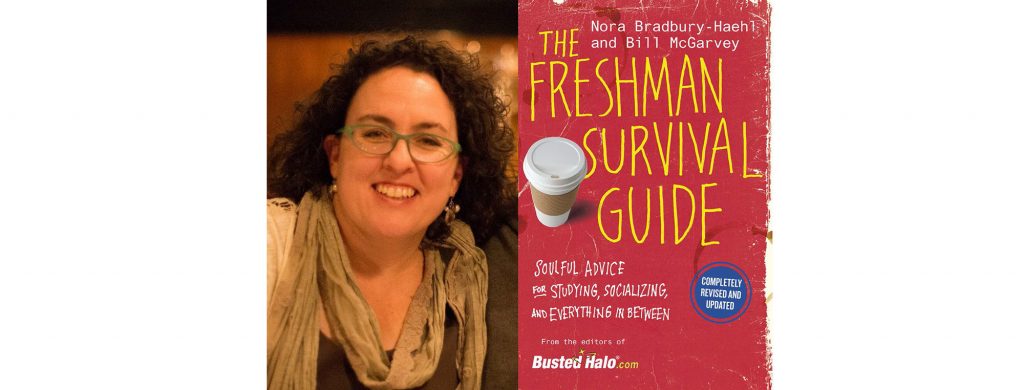The Mooch. The Party Animal. The Neat Freak. The Slob.
These are just four of the “Dirty Dozen” types of roommates college freshmen may encounter, according to the latest edition of “The Freshman Survival Guide: Soulful Advice for Studying, Socializing, and Everything In Between.” The wide-ranging book offers prospective college students tips on everything from dating and drinking to socializing and studying.
“Starting college is like going to a foreign country,” the book states. “You’ve heard stories and read about some of the customs, but until you’re there it’s hard to truly understand the cultural differences.”
Those differences can play into how you relate to your roommates — ideally you should become friends, but “The Freshman Survival Guide” notes this may not be the case if you get one of the Dirty Dozen as your roommate. For example, “the Party Animal is the best roommate during orientation week and the worst roommate during finals week,” the book states, adding, “The best way to deal with The Party Animal is to set ground rules early and hard.” Translation: no dubstep music when you’re studying for finals.
First published in 2011, and updated last year, “The Freshman Survival Guide” was originally written as a piece on BustedHalo.com, a ministry site of the Paulist Fathers. Rochester, New York, Catholic youth and young adult minister Nora Bradbury-Haehl, a content development editor at St. Mary’s Press, co-authored “The Freshman Survival Guide” with Bill McGarvey, Busted Halo’s former editor-in-chief.
“The original article was based on a retreat I had created in my youth ministry work that brought together current college students with high school seniors to offer real-world advice on getting through freshman year,” Bradbury-Haehl says. “Each fall over the next few years we expanded the article, adding interviews with on-campus professionals, and accompanying articles on safety, transferring, and advice from campus ministers.”
The book is deliberately interfaith in its approach, she adds.
“We conducted an interview called ‘God on Campus’ which included chaplains from several different faiths -- Judaism, Islam, Protestant and Catholic Christianity,” she says. “That was just before we started writing the book in earnest and gave us the idea to take an interfaith approach.”
Indeed, although the authors started from a Catholic viewpoint, the guide has evolved into a 369-page tome that even an atheist student could use, given it offers tips on when to wear sandals (in the shower, otherwise you might pick up foot fungus) to how to handle being the first member of your family to go to college. On the latter note, the book outlines tips offered by first generation college students.
“You are on an equal ground with all other freshmen,” the authors write. “Just because your parent didn’t go to college doesn’t make you inferior. All other students are still trying to figure out college, too.”
Letterman liked it
“The Freshman Survival Guide” got an early boost when David Letterman and Paul Shaffer made fun of it on the “Late Show” in 2011. That exposure helped boost the book’s sales, which have climbed to almost 100,000 gross, Bradbury-Haehl says.
“We still don’t know how it got on the show,” she says, adding with a chuckle, “I’m guessing one of the show’s writers’ moms is a campus minister at a Jesuit school.”
Speaking of which, several ministers and academics, including Jewish, Muslim and Protestant campus experts, have heartily endorsed “The Freshman Survival Guide,” and it’s actually become an orientation handout on some campuses. Meanwhile, the book has an online component at thefreshmansurvivalguide.com, which includes an “Interactive RA,” or web-based resident assistant to whom readers can direct questions about their challenges on campus.
“We’ve got a dedicated crew of experienced residential life professionals, and an absolute treasure trove of articles on the site for anyone who is looking for advice or putting together a program for about-to-be-freshmen,” Bradbury-Haehl says.
Meanwhile, the authors are looking to constantly update the book’s words of wisdom, she says, noting today’s incoming freshmen grew up in a digital world.
“Instagram didn’t exist when we wrote the first edition,” she says. “Tinder was just starting to blow up when we were writing the second edition. We also haven’t directly addressed political activism, which has become such a big issue in the last few years.”
On that note, while some observers may dismiss today’s oft-protesting college students as “snowflakes,” unable to deal with debate or criticism, Bradbury-Haehl takes the long view of contemporary campus life.
“I don’t buy that we have a whole generation of overly sensitive people,” she says. “My experience of young people today is that many of them have more knowledge of the world, how diverse it is and how quickly it is changing, and they are calling others to be aware of that. They care about issues like racism, sexism, and other kinds of discrimination, and that can ruffle feathers. It’s easier to call them names than it is to address their concerns.”

